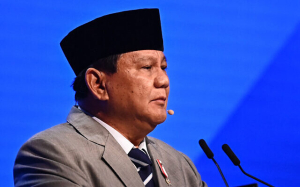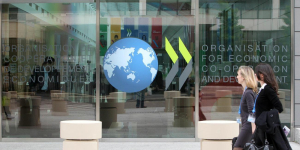Conference calls for fair, transparent critical mineral supply chains
The growing global demand for critical minerals is driving a dual crisis − fragile supply chains and worsening socio-environmental risks − with weak planning and limited bargaining power among producing countries, disruptions in the supply of these minerals threatening the global energy transition, an international conference on critical minerals has revealed.
Quoting the United States Geological Survey (USGS) data, global nickel production in 2024 reached an estimated 3.7 million metric tons (MT), with Indonesia contributing around 2.2 million MT (59.46 percent) of the total. Heavy reliance on a few producing countries increases both economic and environmental risks, requiring systematic management.
A key example of this vulnerability is the decline in production at PT Gunbuster Nickel Industry (GNI), one of Indonesia's largest nickel smelters, processing 21.6 million tons of nickel ore annually. The company is facing near-total shutdown due to the bankruptcy of its parent company, Jiangsu Delong Nickel Industry Co. in China.
GNI’s situation highlights how large-scale investments without sustainable planning can lead to severe economic losses, environmental damage, and labor risks.
In response to these challenges, civil society organizations working on critical minerals convened the International Conference of Critical Mineral-Producing Countries: Mobilizing for Justice and South-South Cooperation. The event, held in Yogyakarta on February 21-22, 2025, gathered representatives from key mineral-producing nations, including Colombia, South Africa, Malaysia, Indonesia, and the Philippines.
The conference emphasized the need for stronger advocacy among Global South nations to ensure a fair and transparent global energy transition. The participants raised concerns about the environmental and social damage caused by critical mineral extraction and called for greater regulatory oversight.
"The situation at PT GNI reflects a mismatch between the rapid issuance of smelter permits in recent years and the readiness of mineral supply chain governance," Bhima Yudhistira, Director and Economist at the Center of Economic and Law Studies (CELIOS), said as quoted in a statement on Sunday, February 23, 2025.
"Mineral-producing countries like Indonesia must impose a moratorium on smelter expansion to regulate supply and stabilize international prices. This moratorium should serve as an opportunity to conduct a thorough review of all policies in the critical mineral supply chain," he added.
Bhima pointed out that low nickel prices, a weak midstream industry, and high environmental risks have left mineral-producing countries at a disadvantage in negotiations with buyers from stainless steel and electric vehicle industries.
"Strengthening cooperation among critical mineral-producing countries should focus on governance principles, sustainable industrialization, and stricter environmental standards − this includes avoiding the expansion of coal-fired power plants in industrial zones," he said.
Harmful impact of mining
The conference also highlighted the social and environmental injustices caused by mineral extraction. Jezri Krinsky from the Institute for Economic Justice, South Africa, urged the formation of alliances to address issues related to poor working conditions, health risks, environmental degradation, and unfair wealth distribution.
"We must organize alliances that bring together affected groups − farmers, Indigenous peoples, workers, and urban communities − who bear the greatest burden of critical mineral exploitation," Krinsky said.
Despite rapid expansion of the mineral extraction industry, the social and environmental costs outweigh the economic benefits for producing countries. Many of the world's richest mineral deposits are located in ecologically sensitive areas and indigenous lands, where mining activities have led to deforestation, water contamination, and displacement of local communities.
"Mining in environmentally sensitive areas should not be permitted. The irreversible damage demands strong regulatory frameworks and a commitment to sustainable practices that genuinely protect the environment and public health," Theiva Lingam of Friends of the Earth (FoE) Malaysia said during the discussion session.
Transparency and accountability
Conference participants called for the establishment of clear and consistent regulations to address contradictions in current policies. While critical mineral extraction is aggressively promoted for battery production, environmental oversight remains inadequate. Without strong governance measures, global sustainability targets − such as achieving net-zero emissions by 2045 − risk becoming empty promises.
Valentina Rincon, representative from Centro Regional de Empresas y Emprendimientos Responsables (CREER), Colombia, stressed the importance of creating platforms for civil society organizations across the Global South to exchange experiences and best practices to strengthen advocacy.
"Through collaboration, we can reinforce human rights frameworks in critical mineral supply chains, promote governance models that prioritize participation, accountability, dialogue, and justice in the energy transition − especially for directly impacted communities," Rincon said.
The conference also underscored the urgent need for corporate accountability and supply chain transparency. Participants demanded mandatory disclosure of mineral sources, financial flows, and environmental impacts of mining operations. Currently, only a handful of companies publicly disclose the origins of their nickel, making effective oversight and regulation difficult.
Already have an account? Sign In
-
Start reading
Freemium
-
Monthly Subscription
30% OFF$26.03
$37.19/MonthCancel anytime
This offer is open to all new subscribers!
Subscribe now -
Yearly Subscription
33% OFF$228.13
$340.5/YearCancel anytime
This offer is open to all new subscribers!
Subscribe now






